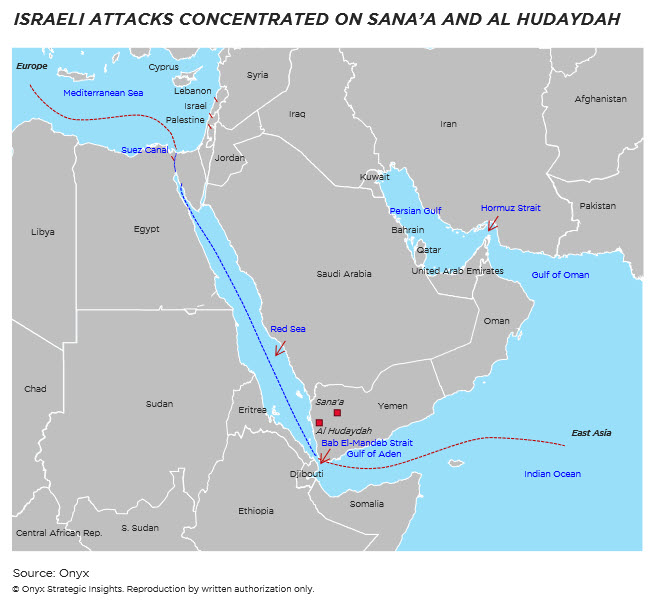
Search our articles
Israel shifts attention toward the Houthis in the Red Sea

Key Insights:
- What is happening: With Hamas' top leadership largely neutralized and Hezbollah significantly weakened in Lebanon, Israel is now focusing on the Houthi rebel group in Yemen, which has been regularly targeting commercial shipping in the Red Sea and launching missile attacks on Israel.
- Why it matters: The Houthis' attacks have disrupted Red Sea shipping lanes, and the closure of this trade route partially offsets new ocean capacity, further tightening shipping markets. Intensified Israeli strikes could weaken the rebel group and diminish its ability to disrupt maritime activity in the Red Sea.
- What happens next: Following the Gaza ceasefire between Israel and Hamas, the Houthis announced that they will limit their attacks on commercial vessels to Israel-linked ships and stop attacking US and UK vessels in the Red Sea area. While this latest announcement is a step toward normalization, it is unlikely to result in an immediate, mass return to the Red Sea trade route.
ANALYSIS
With fewer threats along its borders, Israel is now focusing on the Houthis in Yemen.
Israel’s growing attention to Houthi strongholds in Yemen follows ceasefires with Hamas in Gaza and Hezbollah in Lebanon. With fewer immediate threats along its borders, Israel is strategically reallocating its resources to curb the Houthis’ influence in the Red Sea.
The Houthis have consistently disrupted shipping lanes in the Red Sea, targeting commercial vessels and escalating tensions in one of the world’s most vital maritime corridors. These attacks have forced many vessels to reroute via the Cape of Good Hope, adding significant journey times and costs. Additionally, the closure of this trade route has partially offset new ocean capacity, exacerbating tight conditions in shipping markets.
Israel has ramped up military operations aimed at weakening the rebel group’s capabilities. Reports indicate increased precision strikes targeting Houthi strongholds, including their missile facilities and command centers. The focus has been on key areas such as the capital, Sana’a, and the port city of Al Hudaydah, where the Houthis derive much of their strength and resources. Weakening these strongholds could limit the Houthis’ ability to disrupt maritime activity, allowing commercial vessels to resume safer passage through the Red Sea.

What’s on the horizon?
Following the recent ceasefire between Israel and Hamas, the Houthis announced that they would restrict their attacks to Israel-linked ships while ceasing assaults on US and UK vessels in the Red Sea. The announcement reflects the Houthis’ strategic recalibration, possibly to preserve their resources or avoid drawing broader international focus.
While this statement may signal a step toward de-escalation, an immediate, large-scale return to the Red Sea trade route is unlikely. This is because merchant vessels remain at risk due to the fragile ceasefire and the potential for Houthi retaliation triggered by actions from Israel, the US, or the UK, which could once again disrupt the trade route. Moreover, the underlying risks to maritime security remain, as Israel-linked vessels continue to be prime targets. Shipping companies are likely to adopt a cautious approach, waiting for sustained periods of calm before returning to traditional routes.
Topics: Middle East, Trade, Infrastructure, Maritime, Politics

Written by Onyx Strategic Insights

